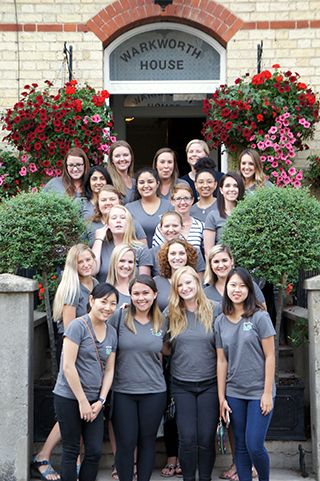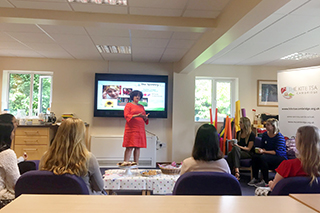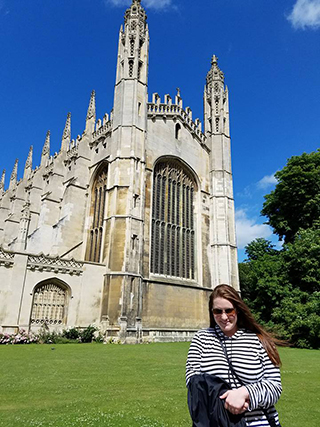2017 News Stories
Students gain international teaching experience, perspectives through Cambridge study abroad program
by Abby Rinaldi
(August 2, 2017) — Four weeks may feel like a short period of time, but when it’s spent in the Cambridge
Schools Experience study abroad program, USF College of Education students say it’s
enough to change their lives.

The Cambridge School Experience program puts elementary and early childhood education students from undergraduate to doctoral levels in the classroom at one of four partner schools in Cambridge.
Danielle Dennis, an associate professor in the literacy studies program at USF, heads the study abroad program each year. Serving as an accelerated internship, the trip puts elementary and early childhood education students from undergraduate to doctoral levels in the classroom at one of four partner schools in Cambridge.
Students teach different subjects in the classroom or do work beyond the classroom. Some work as content coaches and help guide undergraduate student teachers. Others work with the schools to develop and implement guided reading.
“We share a common vision across those schools and so we’re all very much in it to learn from one another,” Dennis said. “I think what that means is that our students get a lot of opportunities to teach and try new things with the support of mentors who are very much bought into the program and the work that we’re doing.”
The program runs from early June to early July. For James Kilsby, a head teacher at Cottenham Primary School, one of the program’s partner schools, the arrival of the USF students is as normal as the changing seasons and as energizing as a shot in the arm.
“For us, it’s the harbinger of summer, if nothing else,” he said.
For the duration of the trip, students are teaching in the classroom, taking courses and attending seminars. A change from previous years, whole group seminars took place on Fridays at different partner schools where the students hear from head teachers.
At a school where 37 different languages are spoken, there was a seminar on global competencies. At another school, a Google certified educator conducted a seminar on digital literacies.
“What we found (was) … the thoughtfulness of the conversations and the way that they were able to make connections between seminars and their school experiences, just all the pieces of the puzzle were really heightened,” she said.
There was also plenty of room for discussion outside of the seminars. Meghan Ward, a master’s student in literacy studies, said she had a 45 minute bus ride to and from school each day and she would talk to her fellow students on the way.

Spinney Primary School head teacher Rachel Snape provides an inspirational message to USF students during the beginning of their program. Photo provided by Danielle Dennis
“Just being able to interact with (other students) and hear what they’ve experienced, how their lessons went, we can all instantly reflect,” she said. “We can share ideas, help make the situation either better or change things — versus when you do an internship in the states, you get in your own car, you leave, you go home, you can call whoever, but just being together, I feel as though everyone is learning from each other.”
The cultural contrast centerpiece for the program is learning about the differences between the U.S. and UK school systems.
“I think what’s really cool about the experience is that, initially, when the students arrive, the two systems look very different and sound very different,” Dennis said. “But then I think as we move forward, they start to see more similarities and that allows them to really think about how they can bring back some of the practices they learned and implement them in the schools in the U.S.”
Dennis said she feels the program changes the lives of the students who participate each summer, because it builds their confidence and provides them with new perspectives.
“It changes them, and so as they change as individuals, I do think it broadens their lens as teachers because they are better able to think about the concerns and fears and unknowns that children might have and ways to support those as they go,” she said.
Sherridon Sweeney, a doctoral student in literacy studies, has gone on the trip many times before and continues to return each summer. She said when Dennis told her how much she would gain from it, she couldn’t turn the opportunity down.
“I also knew it would push me outside my comfort zone and expose me to new perspectives and teaching practices,” Sweeney said. “That was something that I valued then and continue to value today … It’s just impossible for me to grow if I’m comfortable.”
She said the experience has been life-changing, and that she has made many memories during her time exploring the city and everything else the program has to offer.
“For me, during my first summer here, I came to realize how many ideas, customs (and) values I had never been exposed to or thought about, and now I can’t stop exploring and asking questions,” Sweeney said. “It’s truly changed the trajectory of my life, and I look forward to traveling and learning about new people, places and ideas for the rest of my career.”
Sweeney plans to pursue her own international partnerships in the future, which she said she is learning how to do through the skills she’s gained in the program.
“No matter what I do when I finish my PhD, I know I want it to involve international partnerships in some way because I think my work will miss out on so much if I’m not talking, thinking and collaborating with a diverse range of perspectives,” she said.
Ward said she was drawn to the trip because of the passion she saw in Dennis had about her work in Cambridge. She also liked that the program aligned with her own ambitions.

Meghan Ward, a master’s student in literacy studies, uses her free time during the program to explore the country.
“One of my professional goals that I have had is to obtain new knowledge and perspectives on literacy in different countries, different grade levels, the best practices they use, how they teach reading, how they teach writing, things like that,” Ward said. “I just wanted to be able to add to my own teacher toolbox and come back with things that I can apply in my own classroom and overall become a more well-rounded literacy expert. I feel as though looking at another country definitely is something that I needed to do in order to make that happen.”
Ward has observed the differences between the U.S. and UK school system during the trip and looked for things to take back and integrate into her own teaching.
“(Teachers in the UK) do a flawless job of integrating everything together,” she said. “All of their lessons just seems to be meaningful and purposeful … They integrate art, they integrate math, science, reading, writing – it just seems like a flawless system.”
Kilsby said the main difference between the school systems is the way teachers can approach material.
“A lot of it comes down to the freedoms we have in the UK around bringing the curriculum to life and the fact that it’s not as prescriptive as what it is in the states,” he said.
Although Kilsby does not observe the USF students after they leave Cambridge, he said he is sure of the program’s lasting effects on those who participate.
“I think this stuff is a slow burner,” he said. “I don’t think it’s necessarily the case where you do a four or five week placement in the UK and then you have some sort of epiphany when you go back. Undoubtedly, it helps to understand different contexts. It helps to see different things. I mean, even just going into different schools across the county of Hillsborough, I’m sure … that’s going to be powerful.
When you go across schools in different counties in Florida or across different states, that’s going to be powerful, let alone when you then go across the other side of the world and you’re dropping into schools in a different country. Your understanding of different strategies, your understanding of different contexts, that’s going to be developed.”
During a time where the idea of a globally competent teacher is heavily stressed, Dennis said the ability to experience and understand different cultures is an important tool for teachers.
“It disrupts your thinking enough to realize that all those pieces are there and that there’s a benefit in diversity, but you just have to be able to seek out how those differences can support your ultimate goals,” she said.
For Sweeney, programs such as the Cambridge School Experience not only benefit teachers, but their classrooms as well.
“Global experiences like studying abroad give educators and future educators opportunities to have their ‘norms’ disrupted, and can challenge their world views in ways that I don’t think could happen otherwise—at least not to the same extent,” Sweeney said. “To me, this increases their chances of providing every child in their classroom with an equitable education.”
Ward shares this idea, saying it’s very easy as an educator to forget about the outside world.
“I feel as though it’s very easy as an educator – and I can say this myself – you walk into your classroom, you close the door and your world revolves around those four walls,” she said. “… You think about your classroom and your school and obviously the neighborhood your students are coming from, but that’s it. Yet there’s a whole other world out there that are learning and a whole other world out there that are teaching kids how to read, how to write, how to do math, successfully.”
With her head full of ideas after the Cambridge School Experience, Ward plans to integrate that outside world into her classroom.
“I want my kids in my classroom to have the best possible experiences,” she said. “I think my job as a professional is to look as far out as I can to find research based ideas and my personal experience to draw from in order to make that happen within the small world that my classroom revolves around.”
To learn more about the Cambridge Schools Experience study abroad program, visit the USF Education Abroad website.